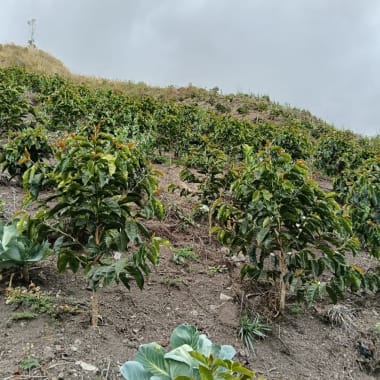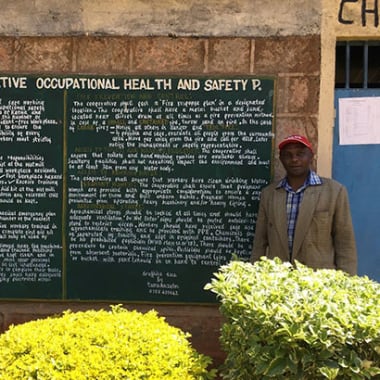Kenya
Kiamabara
We’re pleased to return to one of our favourite Kenyan origins from the first year of Brew Crew to share their latest harvest.
This is also the first of the fresh harvests from Kenya that we’re sharing, after the crops arrived at our roastery in Sydney in the first few days of June. Harvested and processed in Nyeri County, Kenya, at the very end of 2015, they then made their slow journey through Nairobi to port, and then on to Australia via Melbourne before arriving here in St Peters.
Kiamabara Coffee Factory
Kiamabara Coffee Factory is located in Nyeri County near Karatina Town, and together with Gatina it makes up the Mugaga Farmer Cooperative Society (FCS).
The factory was built was in the early 1980s to process coffee cherry from the neighboring farms, and draws from the nearby Kingu river for its water supply.
The factory receives assistance from the organisation Coffee Management Services, whose long-term goal is increasing coffee production through farmer training, input access, Good Agricultural Practice seminars, and a sustainable farming handbook updated and distributed annually.
They share our desire to establish transparent, trust based relationships with farmers, helping to support a sustainable industry in Kenya and rewarding high quality coffee with premium prices for farmers.
Farmers have access to pre-financing for their crops are given advances for school fees and farm inputs. The factory manager’s training is updated every year by Coffee Management Services, together with field days held by the minister of agriculture and agrochemical companies that deliver inputs to the farmers.
Demonstration plots of coffee are planted at the factory to demonstrate and reinforce the best practices shared with farmers throughout the year.
The harvest
After picking, ripe cherry is brought to the factory before it undergoes processing to remove the skin and pulp – known as the wet processing method. Wastewater is discarded in soaking pits, and is also recirculated for conservation.
The factory uses a disc pulper with three sets of discs to remove the skin and fruit from the inner parchment layer that is protecting the green coffee bean.
After pulping, the coffee is fermented overnight to break down the sugars. It’s then cleaned, soaked and spread out on the raised drying tables. Time on the drying tables depends on climate, ambient temperature and volumes under processing, and can take from 7–15 days in total.
From farmer to coop to factory
Kenya’s coffee crops come from smallholder coffee farms, large estates and small estates. There are over 700,000 smallholders who make up about 55% of the Kenya’s production.
Smallholders are organized in to cooperative societies, which act as umbrella organisations for the factories (also known as wetmills) where these producers deliver their coffee crops for processing.
There can be several factories in an area which farmers are free to choose to deliver their cherry. Due to the traditional auction system in Kenya, quality is rewarded with higher prices. Better factories attract more farmers by producing coffee that fetches the highest prices, in turn giving higher returns to the farmers.
The beautiful photo of Mt Kenya that accompanies this coffee is from Picha Zangu (Jared G Maina Photography) used with permission. There’s lots more photos on his website.
Sourcing and ingredients
100% SL28, SL34, Ruiru 11, and Batian coffee beans, provided by Silo and roasted by us on Gadigal land / Sydney.
Country grade: Unknown ?
Packaging
Bag: ABA Certified home compostable
Label: Recyclable
Valve (on bags larger than 250g): General waste
Coffee ordered online is shipped in a recyclable cardboard box
Brewing this coffee
We recommend brewing this coffee 15–49 days post-roast. If pre-ground, brew as soon as possible. Our advice on storing coffee.
1:3
dose:yield
ratio
To brew on espresso, we recommend using 20g of beans (dose) to get 60g of espresso out (yield), during 24-28 seconds.
1:16.7
beans:water
ratio
To brew in infusion/fed brewers (V60, Chemex) use a ratio of 1:16.7 ratio of beans:water.
1:14.3
beans:water
ratio
To brew in immersion brewers (plunger, AeroPress, Kalita, batch brewer) we recommend using a 1:14.3 ratio of beans:water
1:12
beans:water
ratio
To brew as cold brew we recommend using a 1:12 ratio of beans:water
Varietals
Batian varietal
Batian is the latest variety to be developed in Kenya, it is named after the peak of Mount Kenya
Ruiru 11 varietal
Released in 1985, Ruiru 11 is a disease resistant varietal developed in Kenya
SL28 varietal
SL28 was developed in 1931 by Scott Laboratories to suit the growing conditions in Kenya. The varietal is known for its exceptional cup quality
SL34 varietal
Developed by Scott Laboratories in Kenya, the SL34 varietal was designed to be high yielding with good cup quality.
The location
Coffee from Kenya
Alongside Ethiopia and Colombia, Kenya is one of the origins we get most excited about at the roastery. It exports some of the most vibrant, bright, and unique coffees in the world.
The Nyeri region of Kenya
Central region home to Mount Kenya, an extinct volcano that produces rich, red soil. Most commonly smallholder cooperatives. Coffee trees in this region produce two crops (the main harvest producing the higher quality lots)
Farm processes
Washed process
Machines are used to remove the flesh from the coffee cherry before being fermented in water, washed again, and finally sun dried. This process tends to result in more distinct, cleaner flavours.
2 brew notes from subscribers
Kenya Kiamabara
 Josh’s Kalita Wave
Josh’s Kalita Wave
- 24g
- 390ml
- 3m 0s
Kenya Kiamabara
 Jared’s V60
Jared’s V60
- 20g
- 300ml
- 3m 0s

Subscribe to a world of coffee
Discover a new single origin coffee from Sample every 1-5 weeks with no delivery fees.
No up-front purchase, and you can pause, cancel, or change plans at any time.
Available to order online this week:

Peru Aromas Del Valle
Flavours of papaya, jackfruit, lime
Body Acidity
Washed Caturra
Roasted omni for filter and espresso
Peru Aromas Del Valle online
Peru Jose Elmer Sanchez
Flavours of black berry, biscuit, green tea
Body Acidity
Washed Typica
October 2024 harvest
Roasted omni for filter and espresso
Peru Jose Elmer Sanchez online
Ethiopia Tadese Teko
Flavours of bergamot, mandarin, mango
Body Acidity
Washed Ethiopian Heirloom
January 2025 harvest
Roasted omni for filter and espresso
Ethiopia Tadese Teko online
Kenya Gondo
Flavours of strawberry, orange, vanilla
Body Acidity
Washed SL28, SL34, Ruiru 11, Batian
Roasted omni for filter and espresso
Kenya Gondo online